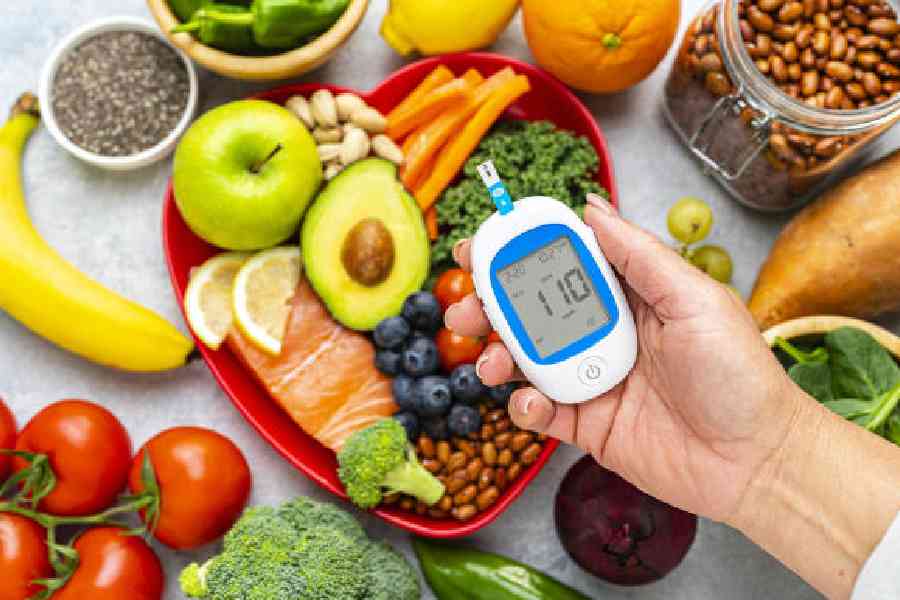You don’t want to wait until you have prediabetes or diabetes to start thinking about it,” said Dr Elizabeth Halprin, chief of adult diabetes at the Joslin Diabetes Center in Boston, US. “You want to think about it to prevent it.”
Your body breaks down the carbohydrates you eat and turns them into glucose, which is then absorbed into the bloodstream. This is the body’s primary source of energy.
Your pancreas senses how much glucose, or sugar, is in the blood and produces a corresponding amount of the hormone insulin. Insulin acts like a key to let sugar into your cells, which use it for fuel.
Some sugar normally remains in the blood and binds to proteins, like haemoglobin. This isn’t a problem in and of itself, but too much can be a bad thing.
“Think about when you spill milk or something sweet on the floor and how sticky it gets,” said Dr Susan Spratt, a professor of medicine in the division of endocrinology, metabolism and nutrition at Duke University, US. “That’s what’s happening inside your body. It attaches to all of your vessels and kind of gums everything up.”
When blood sugar is consistently high, some people develop insulin resistance. That is, the body stops responding well to insulin, and cells don’t take in enough glucose from the blood. The pancreas produces more insulin, but eventually can’t keep up, resulting in high blood glucose levels and, ultimately, prediabetes or diabetes.
Over time, excess sugar in the blood can damage blood vessels, leading to the long-term complications of diabetes.
A haemoglobin A1C test measures what percentage of your red blood cells have glucose stuck to their haemoglobin. The test helps doctors estimate your average blood sugar over the last three months. A blood glucose test directly measures how much sugar is in your blood at a point in time.
Doctors usually measure glucose and A1C with blood drawn from a vein. (They can also use a finger stick test.) They typically test your glucose when you are fasting, meaning you haven’t eaten for at least eight hours, to get an accurate base line. If your fasting glucose and A1C levels are both above certain thresholds — or if one of them is, on two separate tests — doctors can diagnose diabetes.
The American Diabetes Association recommends that physicians initiate blood sugar testing in any adult who is overweight or obese and has any additional risk factor for diabetes. These include having a first-degree relative with diabetes, or having heart disease, high blood pressure or polycystic ovary syndrome.
If results show you are prediabetic, you should have your blood tested annually. If your results are normal, you should be tested every three years. People who don’t have risk factors should begin testing at age 35.
Foods that are heavy in starch or carbohydrates — such as pasta, rice, bread and potatoes — or that are sugary, like cookies, pastries and soda, increase your blood sugar.
“In a person who has diabetes, the relationship between insulin and glucose is deranged,” Dr Halprin said. Sugar spikes cause the pancreas to release a lot of insulin. Blood sugar can then crash, which may produce cravings and leave you feeling unwell.
Eating protein and fats alongside carbohydrates can slow down their absorption and keep blood sugar more steady. “The rise is not as high, and the drop is not as rapid,” Dr Halprin said.
Skipping or delaying meals and drinking alcohol in excess or on an empty stomach can cause low blood sugar, especially in people with diabetes.
What else can cause blood sugar to spike or dip? Exercise helps bring down blood sugar by using up glucose for energy, building muscle that easily takes up glucose and reducing body fat that makes your cells resistant to insulin.
Stress causes a hormone called cortisol to increase, which signals the liver to release
more glucose into the blood, Dr Spratt said. Sleep deprivation can also cause your cortisol levels to go up, she said.
And not sleeping well can indirectly affect blood glucose by making it harder to eat well, lose weight, exercise and deal with stress, Dr Halprin said.
Doctors recommend that patients with diabetes or prediabetes eat a plate that is half leafy green vegetables, one quarter lean protein like fish or lentils, and one quarter starch. Thinking about your meals this way can help people without diabetes stay healthy, too.
Exercise — even just walking for 10 minutes after a meal — can help lower your blood sugar. It can also help with losing weight, which doctors say is an essential part of managing diabetes, in part because it reduces insulin resistance.
When these interventions aren’t enough, doctors may prescribe medication.
“If you have a glucose problem and you’re not able to control it with diet, exercise and getting better sleep and managing your stress, don’t say no to meds,” said Dr Spratt.
NYTNS










